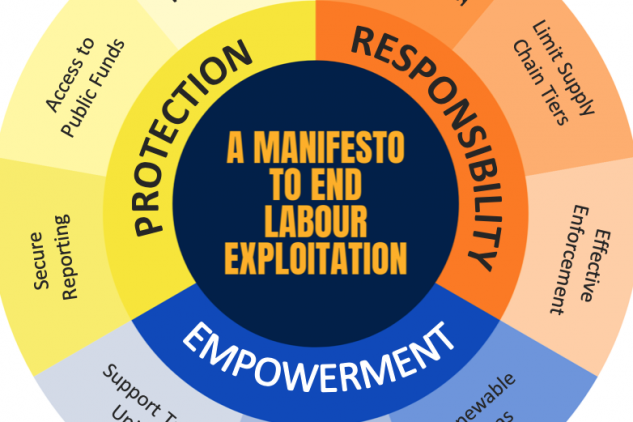
General Election 2019: FLEX’s 9 Steps to End Labour Exploitation
We all want a society in which workplaces feel safe, where workers are protected from abuse and exploitation, and everyone has equal access to help and support.
Sadly, in today’s United Kingdom, government policies are driving workplace exploitation, including modern slavery offences like forced labour and domestic servitude. It doesn’t have to be this way: policies built on principles of protection, responsibility and empowerment could change everything.
Here are our nine policies we need to see from our future government, securing a safer, fairer working world without labour exploitation.
1. Make All Workers Legal
We believe all workers should have decent working conditions, regardless of immigration status. The ‘illegal working’ offence must be repealed.
2. Access to Public Funds
We should all be able to access support in times of need. Migrant workers coming to the UK should be able to leave abusive employers without facing destitution. Post-Brexit migration proposals currently fail to provide this support for short-term workers.
3. Secure Reporting
All workers should feel safe to report exploitation. Our public agencies should never check a person’s immigration status when dealing with labour abuse or exploitation and never do inspections in partnership with immigration bodies.
4. Support Trade Unions
Trade unions are crucial for protecting workers’ rights and upholding labour law. We need to repeal the Trades Unions Act 2016 and support unions to protect our workforce, including sectoral collective bargaining and exploring default union membership for migrant workers on arrival.
5. Experts by Experience Designing Solutions
Workers themselves are the best placed people to design solutions to labour abuses. All labour inspectorates should have workers or their representatives on their governance bodies.
6. Renewable Visas
When visas aren’t renewable, workers don’t have the time to gain language skills, create community ties or integrate effectively. It also limits the timeframe in which they are likely to make claims against employers who’ve been abusive. All temporary migration visas should be renewable. The current Overseas Domestic Worker visa isn’t, nor are proposed worker visas for after Brexit.
7. Effective Enforcement
Government must make workers’ rights and safety a priority by having properly funded, proactive and gender-responsive labour inspectorates and extending licensing of labour agencies to high-risk sectors, such as cleaning and catering.
8. Limit Supply Chain Tiers
Limiting supply chain tiers and regulating which functions can be outsourced will help to address the responsibility deficit caused by an increasing trend toward subcontracting and long supply chains. It will also more work is brought in-house, clarifying where responsibility for working conditions lies and ensuring businesses are held to account for labour abuses and exploitation.
9. Joint and Several Liability
Severe exploitation in the supply chains of brands is common and well-documented. Introducing joint liability laws – like they have in many other European countries – would mean companies at the top can be held accountable.
